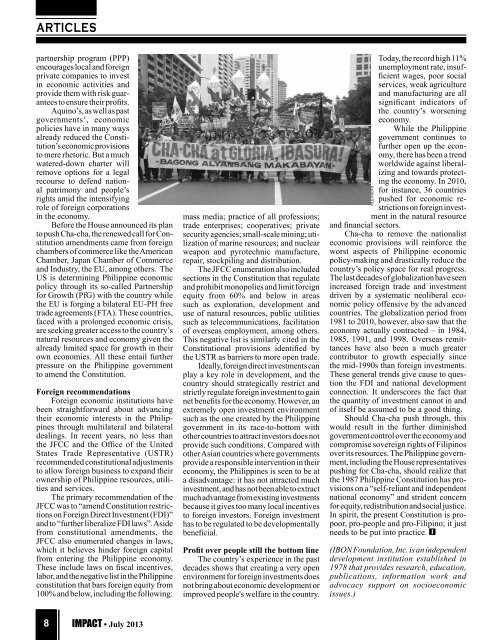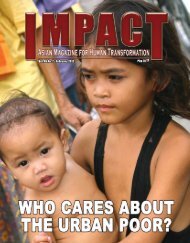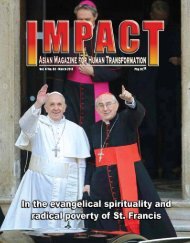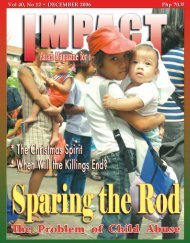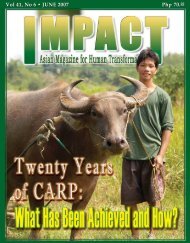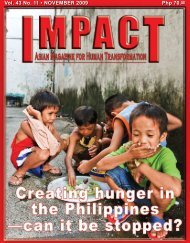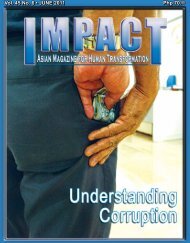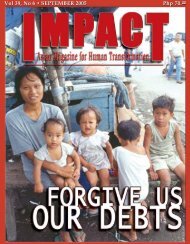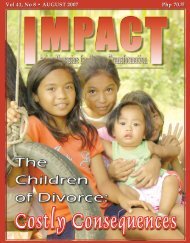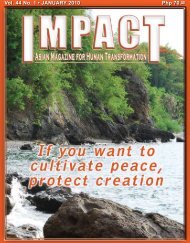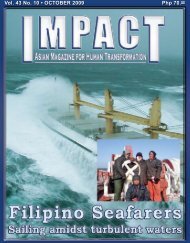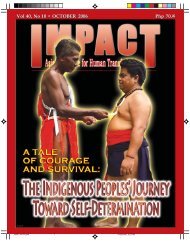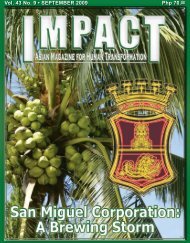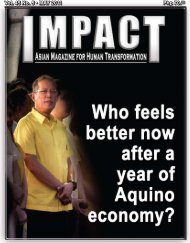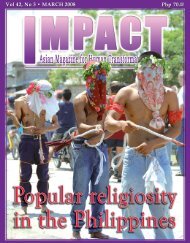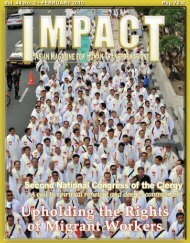Php 70.00 Vol. 47 No. 07 • July 2013 - IMPACT Magazine Online!
Php 70.00 Vol. 47 No. 07 • July 2013 - IMPACT Magazine Online!
Php 70.00 Vol. 47 No. 07 • July 2013 - IMPACT Magazine Online!
Create successful ePaper yourself
Turn your PDF publications into a flip-book with our unique Google optimized e-Paper software.
ARTICLES<br />
partnership program (PPP)<br />
encourages local and foreign<br />
private companies to invest<br />
in economic activities and<br />
provide them with risk guarantees<br />
to ensure their profits.<br />
Aquino’s, as well as past<br />
governments’, economic<br />
policies have in many ways<br />
already reduced the Constitution’s<br />
economic provisions<br />
to mere rhetoric. But a much<br />
watered-down charter will<br />
remove options for a legal<br />
recourse to defend national<br />
patrimony and people’s<br />
rights amid the intensifying<br />
role of foreign corporations<br />
in the economy.<br />
Before the House announced its plan<br />
to push Cha-cha, the renewed call for Constitution<br />
amendments came from foreign<br />
chambers of commerce like the American<br />
Chamber, Japan Chamber of Commerce<br />
and Industry, the EU, among others. The<br />
US is determining Philippine economic<br />
policy through its so-called Partnership<br />
for Growth (PfG) with the country while<br />
the EU is forging a bilateral EU-PH free<br />
trade agreements (FTA). These countries,<br />
faced with a prolonged economic crisis,<br />
are seeking greater access to the country’s<br />
natural resources and economy given the<br />
already limited space for growth in their<br />
own economies. All these entail further<br />
pressure on the Philippine government<br />
to amend the Constitution.<br />
Foreign recommendations<br />
Foreign economic institutions have<br />
been straightforward about advancing<br />
their economic interests in the Philippines<br />
through multilateral and bilateral<br />
dealings. In recent years, no less than<br />
the JFCC and the Office of the United<br />
States Trade Representative (USTR)<br />
recommended constitutional adjustments<br />
to allow foreign business to expand their<br />
ownership of Philippine resources, utilities<br />
and services.<br />
The primary recommendation of the<br />
JFCC was to “amend Constitution restrictions<br />
on Foreign Direct Investment (FDI)”<br />
and to “further liberalize FDI laws”. Aside<br />
from constitutional amendments, the<br />
JFCC also enumerated changes in laws,<br />
which it believes hinder foreign capital<br />
from entering the Philippine economy.<br />
These include laws on fiscal incentives,<br />
labor, and the negative list in the Philippine<br />
constitution that bars foreign equity from<br />
100% and below, including the following:<br />
mass media; practice of all professions;<br />
trade enterprises; cooperatives; private<br />
security agencies; small-scale mining; utilization<br />
of marine resources; and nuclear<br />
weapon and pyrotechnic manufacture,<br />
repair, stockpiling and distribution.<br />
The JFCC enumeration also included<br />
sections in the Constitution that regulate<br />
and prohibit monopolies and limit foreign<br />
equity from 60% and below in areas<br />
such as exploration, development and<br />
use of natural resources, public utilities<br />
such as telecommunications, facilitation<br />
of overseas employment, among others.<br />
This negative list is similarly cited in the<br />
Constitutional provisions identified by<br />
the USTR as barriers to more open trade.<br />
Ideally, foreign direct investments can<br />
play a key role in development, and the<br />
country should strategically restrict and<br />
strictly regulate foreign investment to gain<br />
net benefits for the economy. However, an<br />
extremely open investment environment<br />
such as the one created by the Philippine<br />
government in its race-to-bottom with<br />
other countries to attract investors does not<br />
provide such conditions. Compared with<br />
other Asian countries where governments<br />
provide a responsible intervention in their<br />
economy, the Philippines is seen to be at<br />
a disadvantage: it has not attracted much<br />
investment, and has not been able to extract<br />
much advantage from existing investments<br />
because it gives too many local incentives<br />
to foreign investors. Foreign investment<br />
has to be regulated to be developmentally<br />
beneficial.<br />
Profit over people still the bottom line<br />
The country’s experience in the past<br />
decades shows that creating a very open<br />
environment for foreign investments does<br />
not bring about economic development or<br />
improved people's welfare in the country.<br />
Today, the record high 11%<br />
unemployment rate, insufficient<br />
wages, poor social<br />
services, weak agriculture<br />
and manufacturing are all<br />
significant indicators of<br />
the country’s worsening<br />
economy.<br />
While the Philippine<br />
government continues to<br />
further open up the economy,<br />
there has been a trend<br />
worldwide against liberalizing<br />
and towards protecting<br />
the economy. In 2010,<br />
for instance, 36 countries<br />
pushed for economic restrictions<br />
on foreign investment<br />
in the natural resource<br />
and financial sectors.<br />
Cha-cha to remove the nationalist<br />
economic provisions will reinforce the<br />
worst aspects of Philippine economic<br />
policy-making and drastically reduce the<br />
country’s policy space for real progress.<br />
The last decades of globalization have seen<br />
increased foreign trade and investment<br />
driven by a systematic neoliberal economic<br />
policy offensive by the advanced<br />
countries. The globalization period from<br />
1981 to 2010, however, also saw that the<br />
economy actually contracted – in 1984,<br />
1985, 1991, and 1998. Overseas remittances<br />
have also been a much greater<br />
contributor to growth especially since<br />
the mid-1990s than foreign investments.<br />
These general trends give cause to question<br />
the FDI and national development<br />
connection. It underscores the fact that<br />
the quantity of investment cannot in and<br />
of itself be assumed to be a good thing.<br />
Should Cha-cha push through, this<br />
would result in the further diminished<br />
government control over the economy and<br />
compromise sovereign rights of Filipinos<br />
over its resources. The Philippine government,<br />
including the House representatives<br />
pushing for Cha-cha, should realize that<br />
the 1987 Philippine Constitution has provisions<br />
on a “self-reliant and independent<br />
national economy” and strident concern<br />
for equity, redistribution and social justice.<br />
In spirit, the present Constitution is propoor,<br />
pro-people and pro-Filipino; it just<br />
needs to be put into practice. I<br />
FILE PHOTO<br />
(IBON Foundation, Inc. is an independent<br />
development institution established in<br />
1978 that provides research, education,<br />
publications, information work and<br />
advocacy support on socioeconomic<br />
issues.)<br />
8 <strong>IMPACT</strong> <strong>•</strong> <strong>July</strong> <strong>2013</strong>


